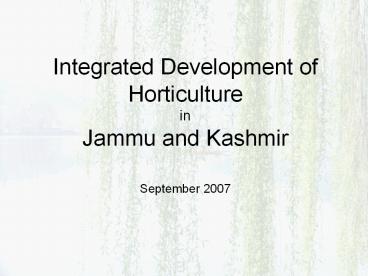Integrated Development of Horticulture in Jammu and Kashmir - PowerPoint PPT Presentation
1 / 17
Title:
Integrated Development of Horticulture in Jammu and Kashmir
Description:
Generates employment: 1 Ha=1.3 person-days/year. Over 7 Crore ... Export of Walnut outside the Country. 92.82. 5417. 257. 2005-05. 99.30. 6001. 300. 2003-04 ... – PowerPoint PPT presentation
Number of Views:340
Avg rating:3.0/5.0
Title: Integrated Development of Horticulture in Jammu and Kashmir
1
Integrated Development of Horticulture in
Jammu and Kashmir
- September 2007
2
- FRUIT PRODUCTION ECONOMIC ASPECT
- Over 5 Lakh families involved
- Over 27 Lakh growers involved.
- Rs.1600.00 Crore income from fresh fruits
- Rs.300.00 Crore income from dry fruits
- Generates employment 1 Ha1.3
person-days/year. - Over 7 Crore boxes of fruit exported/year.
3
Fruit Production Trends
Year Production (MT) increase
2001-02 10.97 ----
2002-03 11.46 4.50
2003-04 12.73 11.09
2004-05 13.31 4.53
4
Average Productivity (APPLE)
Year Area (Ha) Production (M. T) Productivity
2001-02 90080 909583 10.09
2002-03 94874 953946 10.06
2003-04 100702 1041538 10.34
2004-05 107925 1093275 10.12
5
- Apple Production trends
- in leading countries
- (2002)
JK 90,000 9,09,583 10.10
6
Marketing of Major Horticulture Products
S.No Product 2004-05 (Lac Tons) 2005-06
1. Apples 10.93 11.52
2. Cherry 0.074 0.08
3. Pears 0.40 0.42
4. Walnut 1.005 1.083
5. Almond 0.135 0.143
6. Others 0.002 0.002
7
Export of Fresh Fruits out of JK
Year Production (Lakh MT) Exported (Lakh MT) age of fruit exported increase in export
2000-01 8.372 5.016 59.91 -
2001-02 10.008 6.467 61.78 28.92
2002-03 10.457 7.053 67.45 9.06
2003-04 11.657 7.624 65.40 8.09
2004-05 12.176 8.194 67.29 7.47
8
Export of Walnut outside the Country
Year Quantity Exports Quantity Exports Foreign Exchange earned (Lakh INR)
Year In-Shell (in MT) Kernell Foreign Exchange earned (Lakh INR)
1999-00 508 4485 60.55
2000-01 597 7145 109.94
2001-02 987 6415 117.78
2002-03 656 6976 121.23
2003-04 300 6001 99.30
2005-05 257 5417 92.82
9
Market Infrastructure Development Programme
- Establishing a network of
- 21 Satellite markets in major fruit producing
areas of the State. - 3 Terminal Markets
- 22 Apni Mandis (rural primary markets)
10
Technology Mission for Integrated Development of
Horticulture
- Approach
- End to end development of horticulture
(pre harvest to marketing and processing) - Basic Strategy
- Introduction of High yielding varieties/hybrids
and technologies - Post harvest handling and management marketing
- Value addition and processing of produce
- Structure
- Mini Mission I
- For Research and supply of nucleus plant
material (SKUAST and CITH) - Mini Mission II
- Improving production and productivity
- (Directorate of Agriculture and Horticulture)
- Mini Mission III
- Post Harvest Management and Marketing by
National Horticulture Board - Mini Mission IV
- Processing and value addition (coordination by
Ministry of Food Processing Industry)
11
Key Result Area Enhancing Productivity of fruit
crops
Current Productivity of apple 10 tons/ hectare
- Impact Since inception of Technology Mission in
the State (2003-04) productivity - levels have shown no significant improvement.
- Bottlenecks
- Area expansion carried out mechanically
without reference to variety/hybrid to be
promoted, based on recommended technology - Research available with ICAR (CITH) or
SKAUST not involved for developing technically
sound area expansion - No system in place for sourcing and
propagating high quality plant material through
SKUAST or based on SKUASTs evaluation - No mechanism in place to monitor how
subsidy on area expansion was utilised by
beneficiary
12
Key result Area Creation of Water Resources and
on Water Management
Objectives Enable critical irrigation
application for orchards in rainfed areas (70
of orchards)
- Bottlenecks
- Assistance for drip/sprinkler irrigation and
mulching to the beneficiary not commensurate
with the creation of water resources (tubewells
or water tanks)
13
Key result Area Establishment of Nurseries
- Objectives To make State self-sufficient in
generating plant material of recommended
varieties - Bottlenecks
- Departmental nurseries suffer from acute shortage
of funds for recurring expenditure - Absence of verification of genuine and true to
type mother plants being used for further
multiplication - Role of SKUAST (in developing nucleus plant
material for multiplication through departmental
or private nurseries)- marginal
14
Key result Area Infrastructure for Marketing
- Objectives To provide easy market access to
growers and reduce post harvest losses - Bottlenecks
- Technically deficient design of markets
- -no provision for cleaning, grading
and storage - Delays in provision of basic facilities to match
volume of trade, auction platforms
15
Key result Area Research and Development
- Agencies involved CITH (ICAR) and
SKUAST-Kashmir and SKUAST-Jammu) - Bottlenecks
- Research Institution to supply nucleus
plant material to departments. However no formal
demand placed by the department - Departments did not requisition for
specific information/technical advise before
implementing area expansion
16
Lessons for future
- Coordination amongst institutions handling
MM-I, II and III needs to be strengthened at
both planning and implementation stages. State
Level Steering Committee should meet at least
once every quarter to review implementation. - Annual Action Plans should emanate from a 10
year State Strategic Plan based on - identified production zones
- Cultivable area available in each zone for
specified crops - Accessibility of irrigation, minimum
infrastructure - Crops to be promoted/introduced based on SKUAST
recommendations - Total seed planting material required
- Capacity for marketing/processing required
- Disposal of table and processing varieties.
17
Key Strategies
- Raise productivity of fruit crops-10 MTS to 20
MTS in XI Plan for Apples - Collaborate across public-pvt sectors to
produce/supply elite plant material - efficiency of public investment for water
conservation/mgt. - clusters of products for scale and complementary
- investment in post harvest infrastructure
- help mitigate market risks at farm gate will
enable technology adoption - Supply chain management for linking to organized
retail - Shift from traditional crops for
self-consumption to HY varieties of
fruits/vegetables/spices for markets































